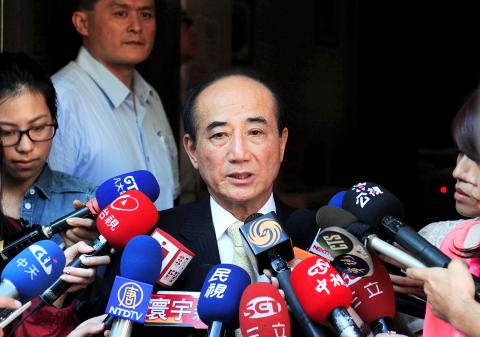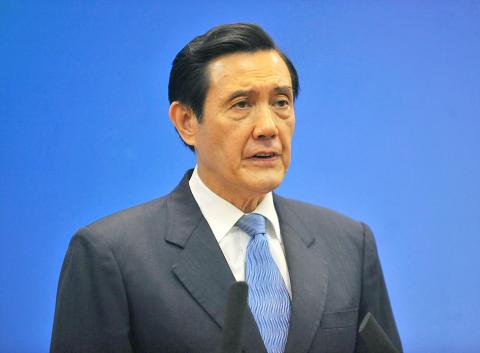At the request of President Ma Ying-jeou (馬英九), the Chinese Nationalist Party (KMT) yesterday revoked Legislative Speaker Wang Jin-pyng’s (王金平) party membership, a move that could strip him of the position he has occupied since 1999, the longest in the nation’s history.
If Wang, a KMT legislator-at-large, fails to reverse the decision through appeals to the party leadership or through other judicial means, his status as a lawmaker will be nullified and he will lose his post as speaker.
The decision was reached by a meeting of the KMT’s Central Evaluation and Discipline Committee.

Photo: CNA
Before the meeting began, Ma delivered a harshly worded statement to the media at 8:30am saying that the influence-peddling case in which Wang is allegedly involved “disqualified” him from being the legislative speaker.
It was the second strongly worded statement about Wang that the president has made since the Supreme Prosecutors’ Office Special Investigation Division (SID) on Friday last week accused Wang of meddling in a breach of trust lawsuit on behalf of Democratic Progressive Party caucus whip Ker Chien-ming (柯建銘) by urging two high-ranking judicial officials to influence a prosecutor into refraining from appealing Ker’s not-guilty verdict.
Huang Chao-yuan (黃昭元), head of the disciplinary committee, said the decision was made after more than two hours of discussion in which it was concluded that Wang “has seriously damaged the party’s image and reputation.”

Photo: Mandy Cheng / AFP
The 15-seat committee was composed of Huang, deputy committee head John Shen (沈榮峰) and 13 other members whose identities were not made public. Four members were absent for various reasons.
Ma, who heads the KMT as chairman, arrived at the party’s headquarters early in the morning and stayed in his office until the committee handed down the ruling at about 11:30am, apparently to see if it would oblige his request that Wang be removed from the party.
As a result, Ma’s 10:15am meeting at the Presidential Office with El Salvadoran Parliament Speaker Sigfrido Reyes was canceled and Reyes was received by Vice President Wu Den-yih (吳敦義) instead.
At the 8:30am press conference, Ma said he has refrained from saying that Wang should resign on his own accord since the SID disclosed the case.
“What I had hoped was that Wang would voluntarily offer to resign as legislative speaker and as KMT legislator-at-large to preserve some dignity for the legislature and the KMT,” Ma said.
Now that Wang has failed to offer to resign, the responsibility to deprive him of his office lay with the KMT, the president said.
“Doing otherwise would be tantamount to acquiescing to judicial dignity being trampled upon,” Ma said.
He again criticized Wang for his “evasiveness” about the “fact” that he “has engaged in influence peddling in Ker’s [case].”
The “hard facts” of Wang’s involvement are obvious, but Wang “didn’t even apologize” for his misconduct, Ma said.
Addressing a meeting of the KMT’s Central Standing Committee in the afternoon, the president applauded the disciplinary committee for making the “right” decision, although it was a “painful” one.
He added that Wang had contributed significantly to the party over the years, “but the [influence-peddling] incident was a chance for the party to wipe away [our] past mistakes and engage in reform, which is the only way to move the party forward and to promote party unity.”
KMT officials who declined to be named said the legislative speaker attended the meeting for just five minutes and told the disciplinary committee that he had neither interfered with a judicial process nor violated the party’s regulations.
After Wang left, Ma was invited to give his position on the matter, a KMT official said, adding that the president had teared up as he talked about his feelings on Wang’s alleged misconduct.
During the discussion, concerns were raised that the membership revocation would be a disadvantage when soliciting votes in southern Taiwan and one attendee questioned Wang’s loyalty to the party, a KMT official said.
A member of the disciplinary committee said he wondered why Wang had reportedly tried to help Ker, but not other party members involved in lawsuits, like Taipei City Councilor Lai Su-ju (賴素如), former Executive Yuan secretary-general Lin Yi-shih (林益世) and Keelung Mayor Chang Tong-rong (張通榮).
Later yesterday, Central Election Commission Vice Chairman Liu I-chou (劉義周) confirmed that the commission had received a message from KMT headquarters voiding Wang’s membership in the afternoon, adding that it forwarded the notice to the Legislative Yuan.
“We received the notice in the afternoon and have forwarded it to the Legislative Yuan,” Liu told the Taipei Times in a telephone interview.
“The Legislative Yuan will now remove Wang as a legislator and notify us in writing once they void his status as a legislator,” Liu said.
“Upon receiving confirmation from the Legislative Yuan, we will formally announce the name of the person who will take over Wang’s seat,” Liu added.
Liu added that, according to the law, Wang would lose his status as a legislator the same day his party membership is rescinded.
Additional reporting by Loa Iok-sin

Tropical Storm Gaemi strengthened into a typhoon at 2pm yesterday, and could make landfall in Yilan County tomorrow, the Central Weather Administration (CWA) said yesterday. The agency was scheduled to issue a sea warning at 11:30pm yesterday, and could issue a land warning later today. Gaemi was moving north-northwest at 4kph, carrying maximum sustained winds near its center of up to 118.8kph and gusts of 154.8kph. The circumference is forecast to reach eastern Taiwan tomorrow morning, with the center making landfall in Yilan County later that night before departing from the north coast, CWA weather forecaster Kuan Shin-ping (官欣平) said yesterday. Uncertainty remains and

SEA WARNING LIKELY: The storm, named Gaemi, could become a moderate typhoon on Wednesday or Thursday, with the Taipei City Government preparing for flooding A tropical depression east of the Philippines developed into a tropical storm named Gaemi at 2pm yesterday, and was moving toward eastern Taiwan, the Central Weather Administration (CWA) said. Gaemi could begin to affect Taiwan proper on Tuesday, lasting until Friday, and could develop into a moderate typhoon on Wednesday or Thursday, it said. A sea warning for Gaemi could be issued as early as Tuesday morning, it added. Gaemi, the third tropical storm in the Pacific Ocean this typhoon season, is projected to begin moving northwest today, and be closest to Taiwan on Wednesday or Thursday, the agency said. Today, there would likely

DISRUPTIONS: The high-speed rail is to operate as normal, while several airlines either canceled flights or announced early departures or late arrivals Schools and offices in 15 cities and counties are to be closed today due to Typhoon Gaemi, local governments announced last night. The 15 are: Taipei, New Taipei City, Taoyuan, Tainan, Keelung, Hsinchu and Kaohsiung, as well as Yilan, Hualien, Hsinchu, Miaoli, Chiayi, Pingtung, Penghu and Lienchiang counties. People should brace for torrential rainfall brought by the storm, with its center forecast to make landfall on the east coast between tonight and tomorrow morning, the Central Weather Administration (CWA) said. The agency issued a sea warning for the typhoon at 11:30pm on Monday, followed by a land warning at 11:30am yesterday. As of

CASUALTY: A 70-year-old woman was killed by a falling tree in Kaohsiung as the premier warned all government agencies to remain on high alert for the next 24 hours Schools and offices nationwide are to be closed for a second day today as Typhoon Gaemi crosses over the nation, bringing torrential rain and whipping winds. Gaemi was forecast to make landfall late last night. From Tuesday night, its outer band brought substantial rainfall and strong winds to the nation. As of 6:15pm last night, the typhoon’s center was 20km southeast of Hualien County, Central Weather Administration (CWA) data showed. It was moving at 19kph and had a radius of 250km. As of 3pm yesterday, one woman had died, while 58 people were injured, the Central Emergency Operation Center said. The 70-year-old